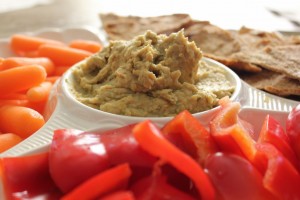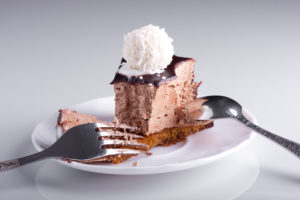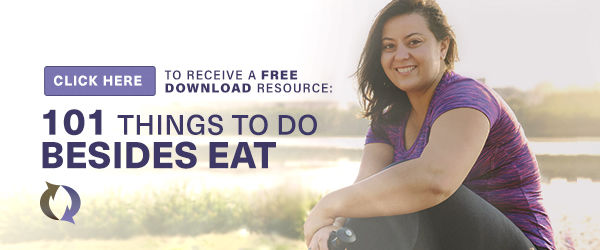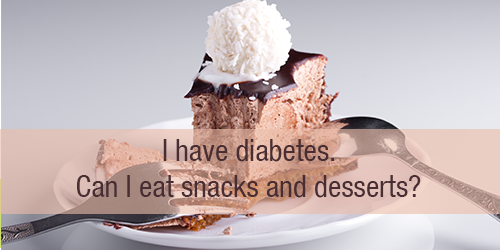Many people with diabetes ask if they should eat snacks and whether they can have desserts. When deciding about snacks and desserts with diabetes, the Mindful Eating Cycle puts you in charge.
Snacks Are Mini-Meals
 To begin, people with diabetes don’t necessarily need snacks every day. It depends on a number of factors.
To begin, people with diabetes don’t necessarily need snacks every day. It depends on a number of factors.
It can be helpful to remember that mindful eating is about eating with intention and attention The intent of eating a snack is to benefit your body. When you choose to have a snack, give eating your full attention.
It’s helpful to think about why you would eat a snack. There are three main reasons.
Three reasons a person with diabetes might need a snack
1. You’re hungry.
When deciding whether to have a snack, first ask, “Am I hungry?” (read this short article for symptoms of hunger) to help you determine whether your body needs additional fuel. Next, determine how hungry you are to help you decide what and how much to eat.
Keep in mind, when you’re a little bit hungry, you only need a little bit of food. Therefore, a small snack, such as a piece of fruit or a yogurt (approximately 15 grams of carbohydrates) might do the trick. When you’re hungrier, choose a larger snack, such as pairing the fruit with an ounce of low-fat cheese or adding a couple of ounces of nuts to the yogurt.
To learn more about deciding how much to eat, review Chapter 17 of Eat What You Love, Love What You Eat with Diabetes.
2. Snacks might be needed to prevent or treat low blood sugar (hypoglycemia).
It is important to remember that having diabetes does not cause hypoglycemia. Individuals are at risk for developing hypoglycemia when they take certain medications and have changes in their medications, their eating, and/or their activity. For example, you may need a snack before bedtime and/or before exercise (see chapter 8 of Eat What You Love, Love What You Eat with Diabetes).
Be sure to talk to your health care team to learn if you are at risk for hypoglycemia and how to prevent and treat it.
3. You need more of a specific nutrient.
You may decide to distribute certain nutrients over your meals and snacks to manage the amount of carbohydrate you eat at one time.
For example, say a woman with diabetes realizes she would benefit from consuming three servings of dairy to get enough calcium in her diet each day. If she has selected other sources of carbohydrates during her meal or is too full to drink a glass of milk, she might choose to eat yogurt or drink a glass of milk as a snack.
Desserts and sweets with diabetes
 There’s a common misconception that eating sugar causes diabetes and that people with diabetes aren’t allowed to eat sugar. It’s true that sugar is a carbohydrate, so it will raise your glucose level – all carbohydrates do. That doesn’t make sugar “bad” or make you “bad” for liking it!
There’s a common misconception that eating sugar causes diabetes and that people with diabetes aren’t allowed to eat sugar. It’s true that sugar is a carbohydrate, so it will raise your glucose level – all carbohydrates do. That doesn’t make sugar “bad” or make you “bad” for liking it!
In fact, telling yourself you can’t have desserts or sweets can lead to feelings of deprivation, craving, overeating, and guilt – the eat-repent-repeat cycle that wreaks havoc with your blood glucose.
A more helpful approach is to acknowledge that the primary purpose of eating desserts and sweets is pleasure.
Again, mindful eating is about eating with intention and attention – so the intent of eating a dessert is enjoyment. It doesn’t make sense to ruin the pleasure with guilt, thoughts of failure, or feeling too full. Instead, if you really like them, fit sweets and desserts into your diet in moderation by counting the carbohydrates and including them in your mindful meal planning with diabetes!
This article was updated from a previous version.
If you enjoyed this article, here are three more to help you:
How do you use MyPlate when you have diabetes?
Experimenting with Food and Blood Sugar
How do carbs affect my blood sugars?



4 thoughts on “Can you eat snacks and desserts with diabetes?”
I think you missed a great chance to inform diabetics, and the world, know that SUGAR did not cause their diabetes. I have heard on TV , Movies, articles, parents to their family saying that “If you eat that candy bar, ice cream, cereal ,etc., you will get diabetes.” Its false. More information needs to out in the public about how and why.
Great point Belinda! I touched on that in the first line under the subheading Desserts and Sweets: There’s a common misconception that eating sugar causes diabetes and that people with diabetes aren’t allowed to eat sugar. We also talk more about that in our book, Eat What You Love, Love What You Eat with Diabetes (https://amihungry.com/marketplace/eat-what-you-love-love-what-you-eat-with-diabetes-a-mindful-eating-program-for-thriving-with-prediabetes-or-diabetes/). Thanks for emphasizing that information!
Comments are closed.